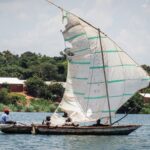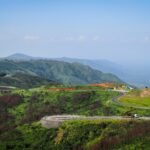Matema is a small but historically and culturally rich town located on the northern shores of Lake Nyasa (also known as Lake Malawi). It’s known for its beautiful lakefront setting, sandy beaches, and surrounding green mountains, which give it a peaceful and almost untouched vibe compared to more urbanised areas.
Historically, Matema has been significant in several ways. The town lies within the traditional homeland of the Nyakyusa people, a Bantu-speaking ethnic group with deep roots in the region. The Nyakyusa have a strong cultural identity, and Matema has served as one of the key points for interaction between their traditional lifestyle and the influences brought by outsiders, particularly during the colonial and missionary periods.
In the late 19th and early 20th centuries, Christian missionaries, particularly from Germany and later from other parts of Europe, established missions in Matema. One of the most prominent was the Moravian Mission, which played a central role in the area’s religious, educational, and medical development. The mission helped build schools and a hospital that still serve the community today. These early institutions became pillars of modern education and health services in the southern highlands of Tanzania.
Because of its lakeside location, Matema has also had economic and ecological importance. Fishing and small-scale farming are the backbone of the local economy, and the lake itself is a vital resource for food and transportation. In recent years, Matema has drawn more attention for tourism due to its natural beauty, attracting travellers interested in hiking, bird watching, and experiencing traditional life along Lake Nyasa.
Lake Nyasa
Lake Nyasa, also known as Lake Malawi in Malawi and Lago Niassa in Mozambique, is Africa’s third-largest lake by surface area and the second-deepest after Lake Tanganyika. It stretches over 560 km and reaches depths of over 700 meters. Tanzania shares its northeastern shore with Matema, offering some of the most peaceful and less-touristed access points.
The lake is famous for its incredible fish diversity, especially cichlids, a colourful group of fish found nowhere else on earth. There are over 800 species in the lake, many of which are popular in aquariums worldwide. The lake is also home to crocodiles, hippos (though less common near Matema), and a variety of birds like fish eagles and herons.
The lake is a vital resource: locals use it for fishing, transportation, and fresh water. Fishing villages dot the shore, and traditional boats (often carved from logs) are a common sight. It has clear waters and sandy beaches, making it perfect for swimming and boat rides, with fewer worries about bilharzia in the northern Tanzanian section compared to some southern parts.
There’s a long-standing but peaceful border disagreement between Malawi and Tanzania over the exact boundary in the lake. Tanzania calls it Lake Nyasa, Malawi calls it Lake Malawi. Same lake, different names depending on where you stand.
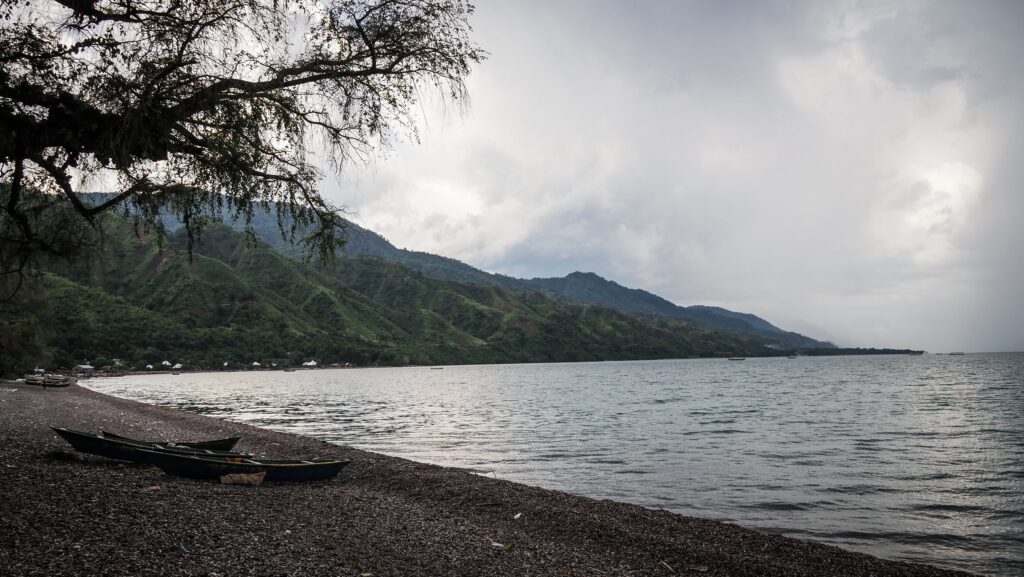
How to get there?
To get to Matema, you’ll first need to make your way to Mbeya, the nearest major city and the main access point to the area.
Step 1: Get to Mbeya
By Air: The fastest way is to fly into Songwe International Airport, which is about 25 kilometres from Mbeya city. There are regular flights from Dar es Salaam and other major Tanzanian cities.
By Road: You can also drive or take a long-distance bus to Mbeya. The city is well-connected by highways, and the road from Dar es Salaam is a popular route.
By Train: Another option is to use the TAZARA railway, which connects Dar es Salaam to Mbeya. It’s slower but can be a scenic and interesting way to travel.
Step 2: Travel from Mbeya to Matema
Once you’re in Mbeya, Matema is about 130 kilometres away, located on the shores of Lake Nyasa.
Public Transport: For a budget-friendly option, you can catch a bus or shared minibus. You’ll get to experience everyday local travel.
By Car: Renting a car or hiring a private driver is a more comfortable but expensive option. The drive takes around 2.5 to 3 hours and takes you through lush landscapes, small towns, and fertile farmland.
Alternative by ferry
There is a ferry connecting Matema with Mbamba Bay, however it’s really hard to get information about its schedule. When I was walking around the beach, I asked a few people and all of them told me different departure time. If you are determined enough, I am sure it must be a great adventure, even though the trip can last about 24 hours. I would love to do it next time!
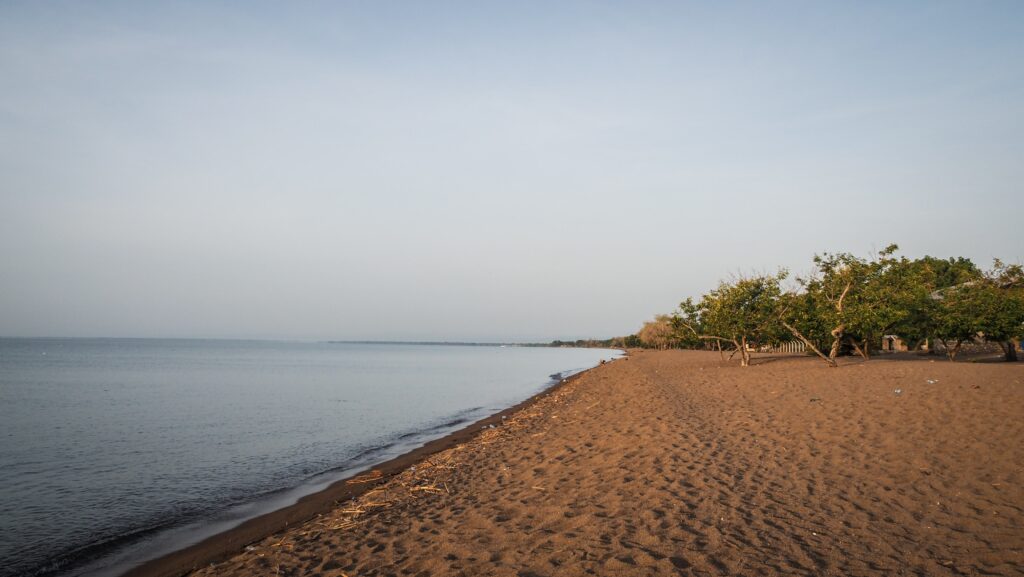
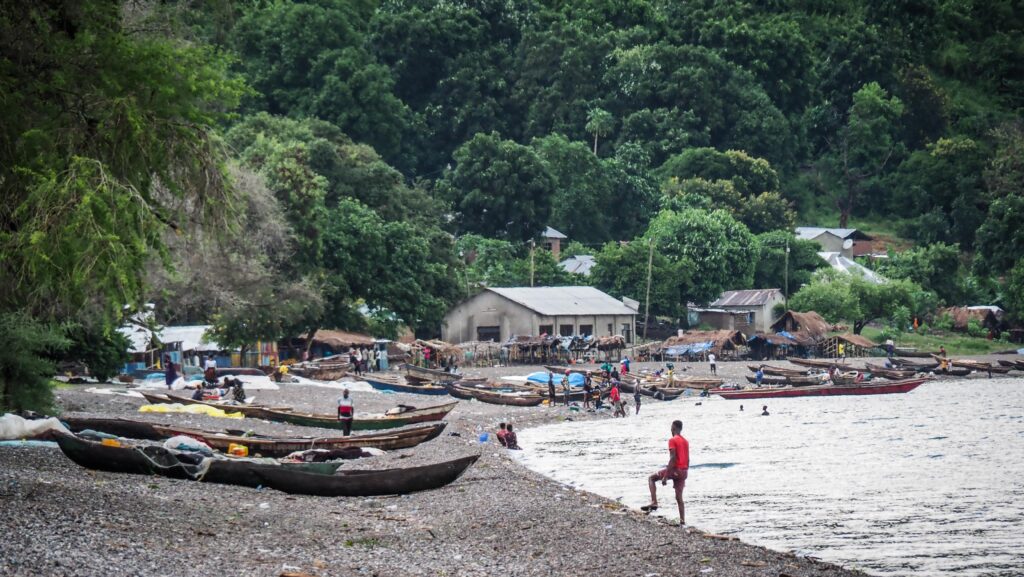
The best time to visit
The best time to visit Matema is during the dry season, which runs from June to October. The skies are mostly clear, temperatures are pleasant, and humidity is low. Perfect for enjoying the lake, hiking around the mountains, or just relaxing on the beach.
Lake Nyasa is calm and clear, making it great for swimming, boat rides, and photography. Roads are more passable during the dry season, especially the stretch between Mbeya and Matema, which can get muddy or washed out in heavy rains.
November to May is the wet season. It’s greener and less dusty, but rain can be heavy. I visited the place in the second half of May, and every day in the afternoon, there was a storm, but usually it didn’t last too long.
Where to stay?
I decided to walk to the Lutheran Centre and ask for a room there. They had one available, but the price was quite ridiculous initially. Luckily, I managed to negotiate down by 50% and paid 40.000 TZS for a room with a fan. The fan didn’t work well, and I asked for another one, which was brought to my room and was much more powerful. Breakfast was not included, but the location was great and the bungalow was basically right on the beach.
Try Palazzo Garden Resort or Landmark Hotel Matema Beach if you need more comfort.
My experience
I didn’t manage to wake up for sunrise even though it was my plan. Luckily, I had two nights in Matema, so there was another chance! I think the noise from the fans in my room was louder than the alarm 🙂
Instead, I walked along the lake shore towards the spot that was marked on Mapy.com a hippo viewpoint. I didn’t see any wildlife, but there was a specific smell in the air that I experienced before in Serengeti National Park near hippo pools, so I think they couldn’t be too far away. Probably they were chilling in the upper part of the river but there was no path to get there.
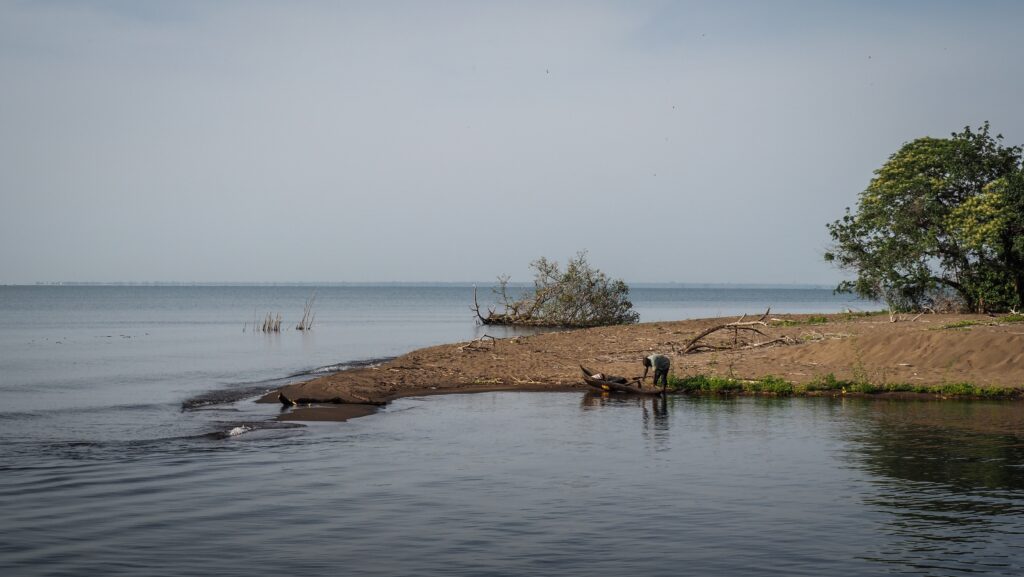
For easy access to the hippo viewpoint, just follow the shore:
Then, I walked to the Matema Waterfall and damn, what a hike it was. The first section was easy, just through the village. Surprisingly, I didn’t meet anyone who wished to be my guide, so I continued alone. Soon, the path involved stream crossing and scrambling on some rocks. Nothing difficult, but my sneakers were way too slippery. Do yourself a favour and wear shoes with a good grip!
Two young boys caught up with me, and I was following them. They were jumping from one stone to another like goats so soon I was left behind. I also gave up on trying to keep my shoes dry and simply stepped into the water.
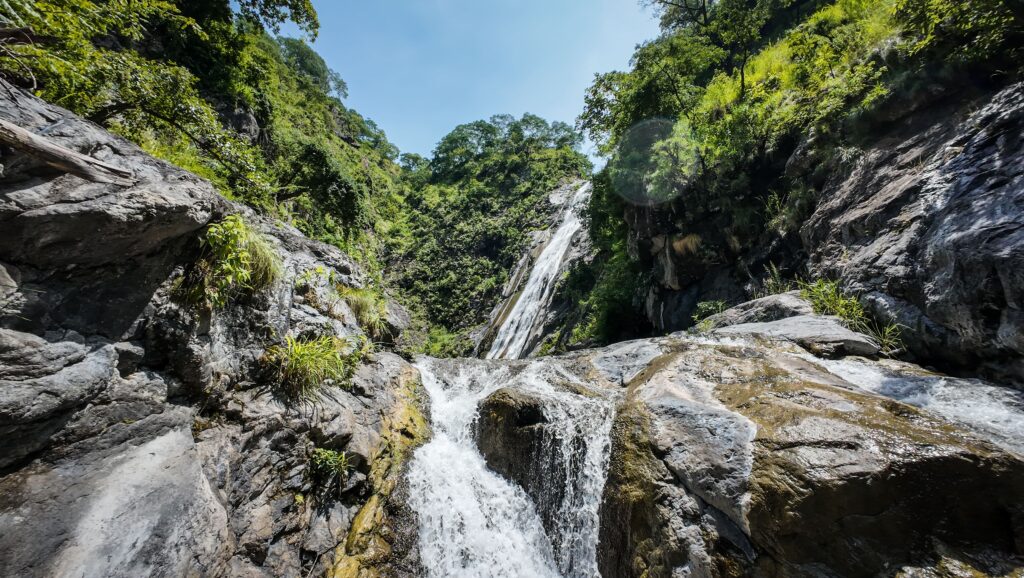
I reached the base of the falls but then the last section involved pulling myself up using the rope. It was really hard time and I had sore muscles on the next day! The views were worth it though and the waterfall was really pretty, with a small pool at its base. Perfect for a quick dip.
I came back the same way, and again I met someone. That time, it was a local guy carrying some stuff in a big bag and heading back to the village. He was very nice, and I could see that he was looking back and checking on me from time to time.
After reaching the main road, I continued the hike towards Ikombe Village. The trail was sometimes really overgrown, and I was doubting if it was a good idea, but of course my stubbornness didn’t allow me to give up and I pushed further to finally arrive at the village.
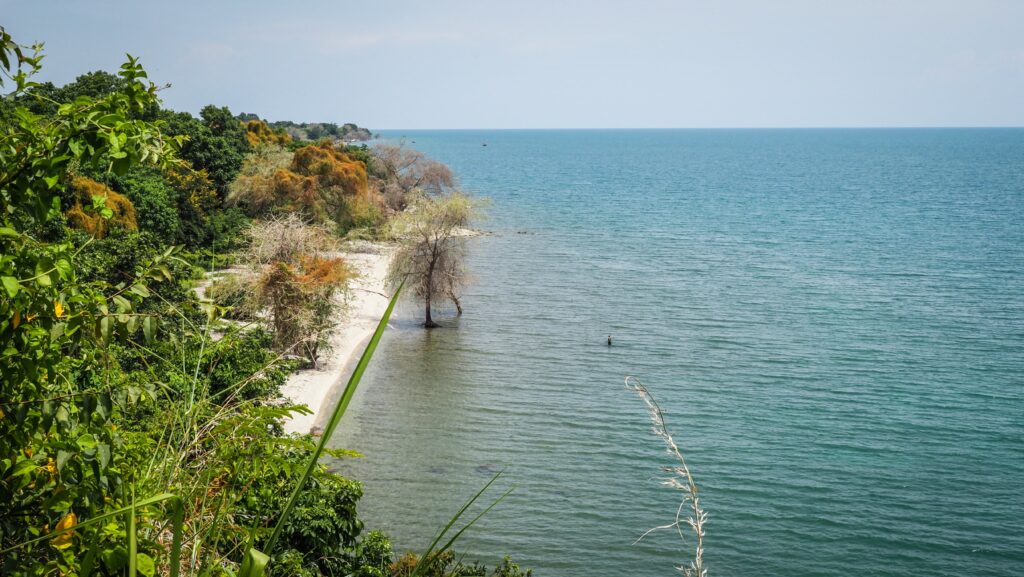
Immediately after entering, I was approach by a guy who offered to take me back to Matema in his canoe. That was exactly was I was hoping for so after negotiating the price and agreeing on 20.000 TZS, we set off. Unfortunately, then the bad part started.
The guy started insisting on showing me the village, his house and all that. When we finally jumped inside the canoe, he stopped next to some shitty cave and then wanted to stop again next to some waterfalls but I said no. He was talking to me in Swahili all the time, sometimes showing the gesture, which I believed was supposed to mean that he wanted more money. I didn’t like his aggressive behaviour and I promised to myself that he won’t get even a shilling more to what we had agreed.
Then, he handed over a paddle to me a few times, saying that I should try paddling myself, but after one try, I didn’t want to continue. He just didn’t understand what ‘no’ meant. The canoe felt very unstable, and I just wanted to arrive back at Matema without any unnecessary experiences en route. When we were approaching the ‘port’ area, I asked him to drop me off there. When I gave him the money, he started yelling and probably cursing at me. I just walked away, ignoring him totally!
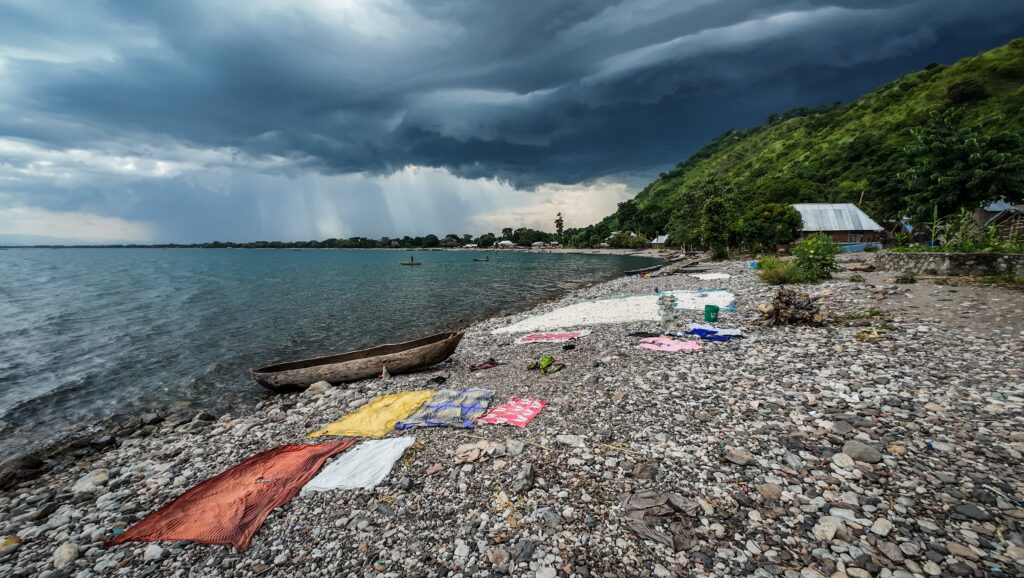
I walked along the beach back to my hotel, but very black clouds were forming on the sky and the wind was getting stronger. It was a matter of minutes for the heavy rain to start. I couldn’t see any place to hide, other than a local house. I went there and met two people sitting on the veranda, so I simply asked them if it’s ok to wait for the storm to finish under a roof for a while. They said I was welcome.
After a few minutes, they invited me to join them for a meal. There was a lady who was probably either a young wife of the owner or his daughter. She came with a bucket of water and poured it on our hands, and soon she served ugali with fish and beans. It was really tasty food, but what I liked the most was the experience of eating in a local house. It’s not that often that you experience real hospitality in Tanzania, without asking for something in return. The guy spoke relatively good English, although he wasn’t too talkative.
When the rain finished, I said goodbye to my new friends and walked back to my room, stopping on the way to buy some chipsi mayai for dinner. I was thinking how quickly the situation can change. From the bad experience on the canoe, to very heartwarming meal shared with strangers. That’s why I love being on the road!
In the night, I went out to see the night sky full of stars and wow, it was freaking amazing! I could literally see the Milky Way! I also made sure to have plenty of alarms, not to miss the sunrise on the following morning 🙂 It was another great spectacle of nature!


